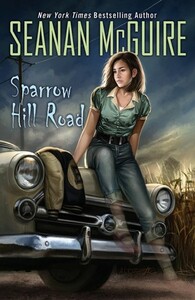You need to sign in or sign up before continuing.
Take a photo of a barcode or cover
I absolutely love the beautiful writing and melancholy tone McGuire has in her ghost stories. The attention to detail and richness of the mythology makes for such fascinating world building and I am totally here for it. The pacing is a little off, as the book reads like a collection of short stories rather than a novel. However, there is an overarching plot (sometimes it’s in the forefront of the story, sometimes it sits in the background) that ties the narrative together and will presumably carry on to the next book.
This was really good and I enjoyed it a lot. It was very atmospheric, the episodic structure suited it. One star deducted because the climax wasn't nearly as climactic as the book seemed to be leading up to, but it was still a very satisfying read.
emotional
hopeful
mysterious
relaxing
sad
fast-paced
Plot or Character Driven:
Character
Strong character development:
Yes
Loveable characters:
Yes
Diverse cast of characters:
No
Flaws of characters a main focus:
Yes
dark
mysterious
medium-paced
adventurous
dark
emotional
funny
mysterious
tense
slow-paced
Plot or Character Driven:
A mix
Strong character development:
N/A
Loveable characters:
Yes
Diverse cast of characters:
N/A
Flaws of characters a main focus:
Yes
This book kept me wondering what was going to happen next and how it would tie into the main story. It was an intriguing book!
Wonderful read. I hope there are more books of similar treatment.
adventurous
dark
tense
fast-paced
Plot or Character Driven:
A mix
Strong character development:
Yes
Loveable characters:
Yes
Diverse cast of characters:
Yes
Flaws of characters a main focus:
Yes
Seanan McGuire is incredibly prolific, so it didn't surprise me to come across a whole trilogy I hadn't heard of before. 'Sparrow Hill Road' loosely ties in with her big 'Incryptid' or 'October Daye' series or both. I'm not familiar with either, but this trilogy gets entangled with SOME other storyline to its detriment.
But. This is the first book and was wholly enjoyable on its own.
Rose Marshall died as a teenager on Sparrow Hill Road in 1952. She hitchhikes across America following a peculiar supernatural urge. She's known as the Phantom Prom Date or the Girl in the Green Silk Gown. There are others like her. Ghosts that inspire urban legend, getting by and following a new set of rules after their deaths. Rose has trouble with the forever young man that ran her over the road all those years ago. Bobby Cross is set on getting rid of her for good. One way or another they both can't travel the ghost roads.
This was really entertaining and was glad to have had the whole trilogy to dig into.
Ghost Roads
Next: 'The Girl in the Green Silk Gown'
But. This is the first book and was wholly enjoyable on its own.
Rose Marshall died as a teenager on Sparrow Hill Road in 1952. She hitchhikes across America following a peculiar supernatural urge. She's known as the Phantom Prom Date or the Girl in the Green Silk Gown. There are others like her. Ghosts that inspire urban legend, getting by and following a new set of rules after their deaths. Rose has trouble with the forever young man that ran her over the road all those years ago. Bobby Cross is set on getting rid of her for good. One way or another they both can't travel the ghost roads.
This was really entertaining and was glad to have had the whole trilogy to dig into.
Ghost Roads
Next: 'The Girl in the Green Silk Gown'
This is the best ghost story I've read in ages. Rose is a wonderful character -- a little tough, but charming, an older woman trapped in a girl's shade. Even more amazing, though, is the world building. Classic Americana meets ghost stories -- it's what I always wished Supernatural would be. There's layers on layers of fantastic stuff in here, the kind of stuff where you start wondering "but how does this work in this world? and how does this work? and what about that?"
adventurous
emotional
tense
slow-paced
Plot or Character Driven:
Plot
Loveable characters:
Yes
Diverse cast of characters:
No
I should've waited to read this 'til I was in the mood for something that reminded me of Supernatural. If you love the ghosthunting and crossroads deals of early Supernatural, you might enjoy this.
This book is a shoot off of the InCryptid books called Ghost Stories. Stories being very appropriate as there is a very loose structure to the novel. The start of it reads like it will be a collection of short stories but later it develops into a more of a novel structure. Which also explains the start of each chapter - an introduction to the world. Each chapter begins by explaining the same thing as the last start of the chapter but in different words. Some are really great but after the first few it doesn't matter how great they are, they are a waste and I was ready to get into the story.
I've not found anything to really explain the connection between this series and the InCryptid but I think they are in the same universe.The InCryptid family is mentioned a couple of times but that is the extent of it. I like when characters cross over into other series for cameos, it gives me a little thrill to see them in their off time, so I would love it if in future books we see more of our stars from the IC series but it's not a requirement.
So this is going to sound crazy and strange but I used to follow McGuire's blog because I LOVE her October Daye series. I stopped following her blog though because McGuire rubs me the wrong the way. She does all sorts of cool things but as online journals and comments have a difficult time with tone, I found myself getting irritated by some of the posts I read. It seemed like she was a bit snotty and rude but then I couldn't tell because the tone was missing. SO, why do I tell you this? I tell you this because there were times when Rose, the main character of Sparrow Hill Road, rubbed me the wrong way in the same way that McGuire's journal/blog did. Every now and then Rose just seemed shitty and unlikeable. Sure, perfect characters make for dull reading and no one is without flaws but there was just something extra shitty about Rose sometimes. Sometimes being the key word because for the most part she was pretty cool and likeable.
A teenager who ages as a ghost but always looks like a teenager. That could go so many ways but McGuire does a good job of showing the perks as wells as the downers, making Rose real and complex. The same goes for the rest of the characters. They are all well written, with even the most minor of characters showing complexity.
I've not found anything to really explain the connection between this series and the InCryptid but I think they are in the same universe.The InCryptid family is mentioned a couple of times but that is the extent of it. I like when characters cross over into other series for cameos, it gives me a little thrill to see them in their off time, so I would love it if in future books we see more of our stars from the IC series but it's not a requirement.
So this is going to sound crazy and strange but I used to follow McGuire's blog because I LOVE her October Daye series. I stopped following her blog though because McGuire rubs me the wrong the way. She does all sorts of cool things but as online journals and comments have a difficult time with tone, I found myself getting irritated by some of the posts I read. It seemed like she was a bit snotty and rude but then I couldn't tell because the tone was missing. SO, why do I tell you this? I tell you this because there were times when Rose, the main character of Sparrow Hill Road, rubbed me the wrong way in the same way that McGuire's journal/blog did. Every now and then Rose just seemed shitty and unlikeable. Sure, perfect characters make for dull reading and no one is without flaws but there was just something extra shitty about Rose sometimes. Sometimes being the key word because for the most part she was pretty cool and likeable.
A teenager who ages as a ghost but always looks like a teenager. That could go so many ways but McGuire does a good job of showing the perks as wells as the downers, making Rose real and complex. The same goes for the rest of the characters. They are all well written, with even the most minor of characters showing complexity.







